You are reading the older HTML site
Positive Feedback ISSUE
13may/june 2004
brinkmann
the LaGrange turntable
as reviewed by Danny Kaey
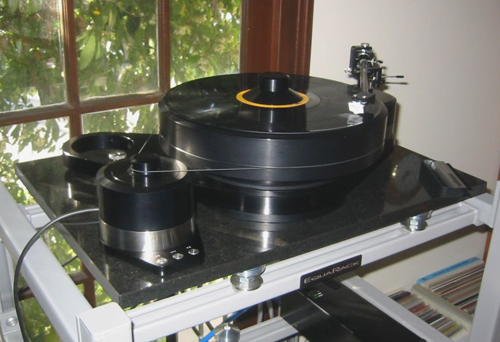
|
DANNY KAEY'S SYSTEM LOUDSPEAKERS ELECTRONICS SOURCES CABLES
|
It's kinda funny how things go. It's 2 AM, and I have less than 48 hours to complete this review for submission to Dave Clark, my master and commander. What's funny about that, you ask? This is the fourth time I have started writing this review! If the words don't flow, then to hell with it, I'll start from scratch. I originally followed the do's and don'ts of any review—start with a description of the product, proceed to its design parameters, follow with listening tests and so on. The problem is, this product is so far off the charts, beyond anything I have ever reviewed, that following the normal review procedure is like calling an Aston Martin just another car. Cash in those RAs, get yourself a new credit card, mortgage the house, sell your kids… err, car, gather around $14K, and place an order for your new Brinkmann LaGrange turntable, complete with tube power supply, 10.5-inch tonearm, and heavily modified Brinkmann EMT cartridge. Of course, you don't want to stop there, so pluck some more money off the money tree and get yourself the best phono stage you can get your hands on. This is it, the real McCoy; the Alpha and Omega, the last turntable you will ever have to buy. Do I sound crazy? Perhaps, but I'll be damned if I know how to better express the emotional connection this turntable offers. Now you see why this is the fourth iteration of this review—this vinyl transcription device is so good that I will gladly wait out the current round of the high-rez digital format wars in favor of a format that enjoys the blessings of audiophiles worldwide.
Let me paint this picture: I came home this evening from a long day at work, flicked on my amp, the tube power supply for the LaGrange, and the phono stage, then, after waiting a few minutes for the tubes to "charge," placed Madonna's strange yet ultra-chic American Life LP on the 40-pound glass/aluminum/steel platter of the LaGrange, cued up "Die Another Day" from the James Bond movie of the same name, cranked up the volume, and went nuts over what came out of my speakers—super tight bass, dynamics that knocked my socks, an incredibly pure and clean midrange, and highs that extended to well beyond 20 kHz. This recording is so powerful and dynamic that it begs the question of why we ever strayed from the LP and launched a digital format that was outdated even at launch time. If this level of utter, total control over the musical signal is at my disposal, who needs a redbook CD player, or any high-rez digital format? The Cary 308T that has served as my reference digital rig for the past year and half has suddenly become so outgunned and outmaneuvered that it is nearly impossible for me to listen to and enjoy any of my CDs (save for the Dean Martin and Frank Sinatra discs). "Die Another Day" is nothing more than superbly composed, orchestrated, and mixed whiz-pop-technobabble, yet through the Brinkmann rig, it comes across as so much more—it's as though Madonna and her sequencer programmers paid you a visit that you couldn't quite afford!
I have become quite the classical music aficionado of late, collecting all sorts of symphonies, concertos, operas, you name it. Cuing up Classic Record's fabulous version of Grieg's piano concerto, I reveled in the clarity, focus, and stunning dynamics my system had to offer. It was so impressive that I found myself playing the record over and over. I couldn't get enough! I have absolutely no doubt that the reason for this is the otherworldly, absolutely meticulous deign, construction, and engineering efforts of Helmut Brinkmann. The LaGrange (named after a 17th century French mathematician) is a "simple," high mass (70 lbs.) design. There is no suspension, no vacuum, no magic gizmos. The table relies on an outboard Pabst motor to drive its massive platter. It is a perfect execution of a well-engineered mechanical design, and it should be on display at the Museum of Modern Art.
Though simple in design, the LaGrange features two unique design characteristics, neither of which are available elsewhere, at least to my knowledge. The first is the use of a tube power supply. Helmut Brinkmann believes that he has found perfect synergy in the most amazing-looking power supply I have ever seen. It achieves a level of performance that Brinkmann believes is superior to that of a traditional power supply. This feature is optional, as the LaGrange normally comes with a solid state regulated power supply that drives both the motor and the LaGrange's other unique feature, the heated platter bearing.
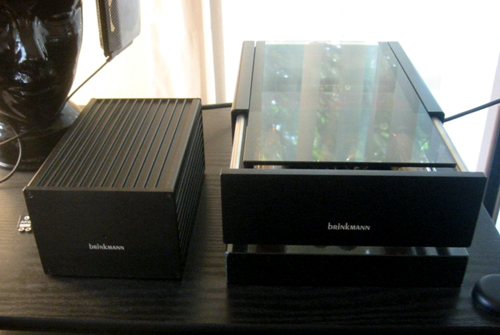
Wha…? That's right, the bearing utilizes a MOSFET circuit that gives off around 20W of heat. Brinkmann discovered that the tolerances of the bearing were so extreme that it benefited from being heated in certain circumstances. These are typically encountered during the winter, when the ambient temperature is less then ideal for the platter to run smoothly and efficiently. As I say, the standard power supply is normally used to drive both the bearing heater and the platter motor. With the addition of the tube power supply, the standard PS is relegated to the bearing and the optional PS drives the motor.
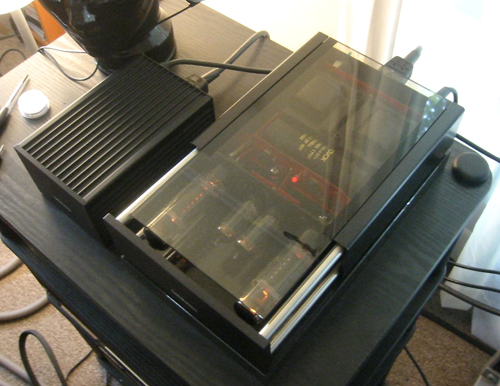
The motor assembly, which is encased in its own beautifully machined, heavy casework, features a really cool touch—each of the three control buttons (33, 45, and off) are touch-sensitive. Simply tap any of the buttons and the table starts to spin, and a little red light illuminates the selected switch. Very neat. Another thing that intrigued me from the start is the simple manner in which tonearms are mounted onto the LaGrange. Each arm (mine turntable is the two-arm version, but a single-arm version is also available) is mounted on its own base, which slides into a perfectly machined hole in an armpod attached to the plinth. You then clamp down the base and voila, your arm is mounted. The idea is that you can have multiple tonearms already mounted in their own bases, and simply mount the preferred arm at any time. The armpod on the turntable's right side can accommodate tonearms up to 10.5 inches in length, and the left pod can accomodate 9-inch OR 12-inch arms. The Brinkmann 10.5-inch tonearm is a unique piece of work that resembles the Breuer arm from Switzerland. It utilizes gimbal bearings and a damped arm lift. The manual states that it utilizes a "double cardanic suspension." Lastly, we have the modified EMT cartridge, which is a naked design that, I have to admit, took some getting used to, looks wise!
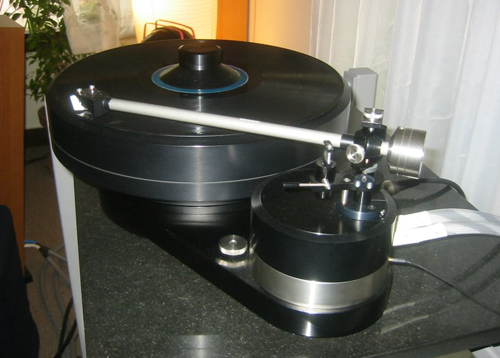
(By the way, those of you with even more funds can choose the older brother of the LaGrange, the Balance turntable, the principal differences being that the Balance has an even heftier platter and omits the LaGrange's dual armboard mount. Other than that, the two tables are essentially identical, down to the heated bearing.)
Speakers Corner's superb new Mercury Living Presence reissue series has arrived with a bang. Though the first release was set of fairly rigorous early 20th century works, the catalog is expanding rapidly to include more mainstream performances like Resphigi's The Birds, a lovely ballet that needs no introduction, except to say that in my opinion, the only way to really hear this awesome work is through this reissue. What Speakers Corner has done here is nothing short of stunning. The soundstage, depth, width, height, microdynamics (you HAVE to listen to the bird chirping effect!), macrodynamics, bass extension, and overall grandeur of this performance is so thrilling that it leads me to question what we have done during the past forty-plus years to advance the state of the art. A friend who owns a fully Modwright-modded Sony SCD777ES, a superb performer on both redbook CDs and SACDs, played the piece on the 1993 Philips/Mercury CD release of this title. I had thought that these reissues were quick, out-the-door type of deal until I learned that Wilma Cozart Fine, the director of the original recordings, was the executive producer of the series. The sound quality of the eleven-year-old CD was quite eye opening, as it had pretty much the same sonic signature as the LP. Still, playing The Birds on the Brinkmann was altogether a different experience. What was awesome and powerful on the Sony had a lifelike, "living presence" on the Brinkmann.
I recently purchased a collectible record from Tosca (aka Richard Dorfmeister, one half of the Kruder & Dorfmeister ensemble) via eBay. This is an excellently produced dub record. Given my fondness for bass, it was an absolute delight to hear this record on the Brinkmann. The bass was incredibly tight and dynamic, and it was truly mind-boggling how much low-end information could be stored on a vinyl record. The same CD in my Cary produces a noticeably softer and delayed image. The drum tracks just sort of play along, while on the Brinkmann they sound like Bruce Lee delivering punches, each one a death-dealing blow. Virtually every bass-test record I threw on the Brinkmann produced this kind of lethal force, with absolutely no hint of distortion, glare, or other signs of stress. I presume that the LaGrange's tight tolerances are responsible for the blackness of space and the super-quiet background that it possesses.
I then played another Speakers Corner reissue, of Tchaikovsky's Swan Lake. The performers were well behind the speakers, in an enormous soundstage that seemed like it projected beyond the parameters of my living room. When I was growing up in Vienna, my mother used to send me to the famous music halls for monthly concerts. I couldn't stand these concerts at the time (!), but I do recall the sense of the performance taking place in front of me. The Brinkmann captures that sense, and the performance is so compelling that I am completely emotionally enveloped in the music. This to me is the single most important sign that a piece of equipment is good. I snapped on the newly released Ella Fitzgerald Sings the Ellington Songbook (Speakers Corner again) and was taken to a whole new level of musical performance. Ella in my living room? You betcha! The transparency, dynamics, and sheer realism of this performance were truly astonishing. Even my wife, a long time non-audiophile, claimed that it was the best performance she's ever heard of a female vocalist.
The Brinkmann LaGrange turntable is without a doubt the best source component I have ever had the chance to enjoy over an extended period of time. It represents a level of perfection and emotional connection to music that I have never heard before. Are there better turntables out there? The Rockport Sirius III? The Simon Yorke? I can't honestly say. Are they awesome performers? I'm sure they are, or at least their reviews suggest this. Can the Brinkmann compete at this stratospheric level? Given its superlative construction quality and design, its ease of use and simplicity, I think I can answer with a resounding YES. I have not seen any other turntable that approaches the build quality and construction of the LaGrange. Is that a subjective statement? I'm not sure, though I do know a thing or two about mechanical engineering (I have a degree from a highly acclaimed aerospace university), and think that I know enough to say it with certainty.
Alas, this level of quality and performance comes with a price. At around $20K for the full setup (depending upon the ever fluctuating dollar), it ain't cheap, but considering its quality, it might even be considered a bargain. Given all this, if you are in the market for your last turntable, you might find yourself in the predicament I was in—that of trying to find a way to purchase it. Danny Kaey
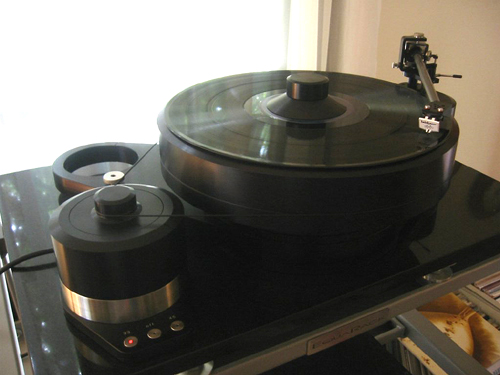
LaGrange 2-arm $10,800
Brinkmann 10.5 arm $3500
Brinkmann EMT cartridge $2500
Tube Power Supply $2,700
Total $19,200
Brinkmann
web address:
www.brinkmann-audio.de
Brinkmann USA
web address:
www.brinkmann-usa.com
